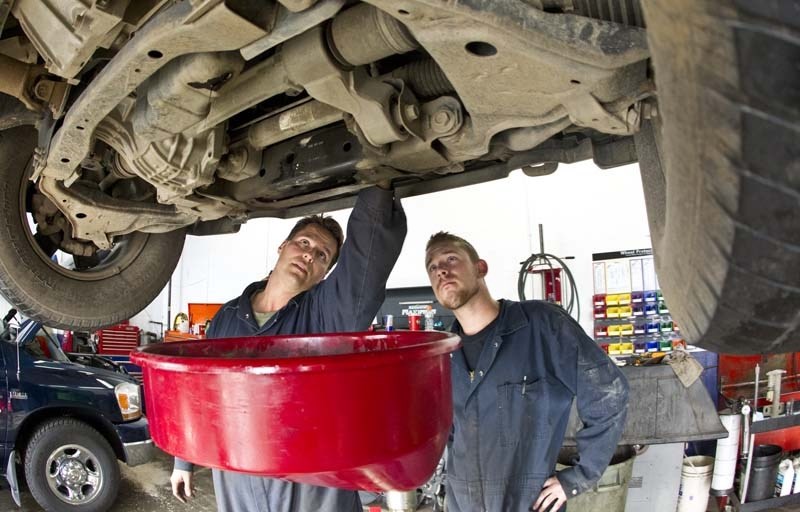It seems just like yesterday that local residents were enjoying sunny drives around town.
But soon enough, Old Man Winter will arrive and bring wind-chills, black ice and snowbanks to local streets. That means now is the time to winterize your car.
Check your oil … and other things
If people maintain their vehicle as outlined in the owner's manual they shouldn't have anything extra to fix in the fall, other than getting a set of proper winter tires, said Randy Loyk with the Alberta Motor Association's (AMA) automotive services.
"It used to be in the old days where you took your vehicle in the fall and in the springtime and you had it tuned up and you did this and you did that," he said. "The manufacturers are now saying that if you properly maintain your vehicle you shouldn't have any problems."
Nonetheless, the AMA recommends three major checkups people should consider at the start of the cold season.
First, Loyk said people should get a regular oil check and use synthetic oil to get through the colder months.
Second, once temperatures fall below minus 15 degrees, people need to plug in their car's block heater to avoid having problems starting their car, he said. He added that timers are useful: the block heater does not need to be on for more than three hours prior to using the vehicle, he said.
And last, people should check their battery, he said.
"If your battery is more than three years old, you should check it once a year to make sure it will make it through the winter," he said. "And if you don't have any leaks or are low on air pressure you should make it through winter."
All-season or winter tires?
Even a good set of all-season tires cannot compare to winter tires, Loyk said. But a set of winter tires can cost up to $1,500 and not everyone can afford them.
"If they can afford putting winter tires on, and especially if they are out in the rural areas, acreages and this type of thing, it's a good idea," he said. "If you don't have the funds … then a good set of all seasons will work fine."
The AMA recommends checking tire pressure, including the spare, to improve traction and control. A well-pressured tire can reduce stopping distances by up to 25 per cent on snow-covered roads.
And if drivers do get their vehicle stuck in the snow, they should not rock the vehicle out by quickly changing gears. That can damage the transmission and other parts of the car, Loyk said.
"If you can't get yourself out, get a tow truck," he said.
Have at set of spare keys handy
The emergency roadside kit may be your best friend if stranded on a lonely road with nowhere to go, Loyk said. That and having your gas tank at least half full all of the time, he said.
He added that it helps to have an extra set of keys handy in case you get locked out of you car.
On average, the AMA receives about 300 calls a day from people who've locked their keys inside their vehicle. That number jumps on colder days, he said, as people leave vehicles to warm up while getting ready for work.
"Also, vehicle thefts go up during these colder temperatures because you have people looking for vehicles while they are running," he said. "They become an opportunity and vehicles get stolen."
Loyk added that people should not let their cars warm up in attached garages as the possibility of getting carbon monoxide poisoning is high. A lot of newer vehicles only need a minute to warm up now, he said.
If people have to start up their vehicle and keep it running, it should be pulled out of the garage, he said.
Winter checkup at a local garage
For those preferring to have someone else look after their car, there are winter checkups offered by most garages at this time of year.
Winter maintenance is essential and many newer vehicles aren't completely self-serviceable anymore, said Brent Elaschuk, owner of St. Albert Tune-Up & Brake.
Winterizing packages cost between $75 and $100, take about an hour, and include everything from checking the block heater, to fluid levels, belts, batteries, brakes and tires. He added that some things, such as light functioning, anti-freeze levels and tire wear can be checked at home.
The most common problem repair shops deal with in the winter are cars that won't start, Elaschuk said.
"Most vehicles get towed in and people cranked the motor and killed the batteries. It's wear and tear on the engine," he said. "That's where plugging it in will help and synthetic oil will help."
In the winter, conventional oil may thicken in temperatures below minus 15 degrees and won't circulate in the engine, he said. Using synthetic oil can cut down on starting resistance, he said, especially if people don't have a block heater.
Have an imported car?
Many imported, European cars don't come with a block heater because they weren't designed for the cold, said Matthew Lee, owner of St. Albert Auto Care, a repair shop in Riel Business Park targeted at foreign and older cars.
Owners of those cars can get a universal block heater installed on their motor block that will heat the engine oil overnight, just like a regular block heater, he said.
Regular block heaters cost about $100 to install but, with a European part, the rate can go up to a few hundred dollars depending on the model of the car, he said.
"But for the sake of you cursing in the morning, the car will start," he laughs, adding that he also recommends people check that the heater inside the car is working.
"And don't forget to unplug your cord before you drive to work. Otherwise you have a 24-foot cord trailing."




